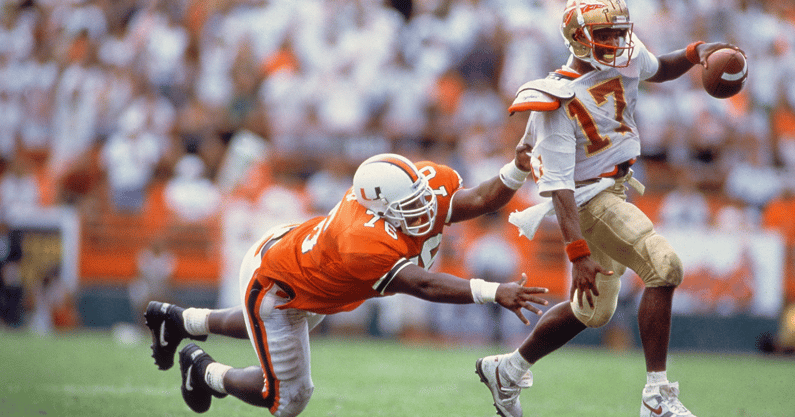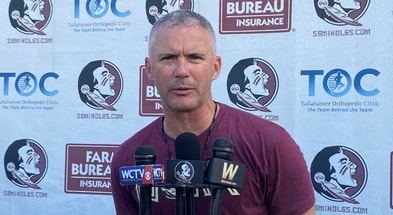Corey Clark: ACC Network documentary gives father and son chance to reflect on greatness of Charlie Ward

On Monday night, I made one of the best parenting decisions of my life.
Instead of letting my 14-year-old son go play video games or watch Netflix in his room, which is the norm these days after dinner, I made him sit down in the living room with his old man and watch the ACC Network’s documentary on Charlie Ward titled, “Twice as Nice.”
I’m so glad I did it.
Because yes, Brady had heard of Charlie Ward. His mom is an FSU grad. Both his grandads graduated from FSU. His dad is me.
So, yeah, Brady Clark had heard of Charlie Ward. He knew who he was.
But he didn’t really know.
Because, unless you lived in it, unless you saw it firsthand, you can’t truly appreciate what kind of spectacle Charlie Ward was at Florida State, and how beloved and admired he was by literally everyone who played with him or against him or coached him or broadcast his games or even met him for a few seconds.
I was Brady’s exact age when Ward was the starting punter for the 1989 Florida State football team. And that was the first time I laughed during the documentary, when they talked about him becoming the team’s punter that year.
“Wait,” Brady said when they showed clips from that time. “He was a punter, too?”
Yep. Charlie Ward was so naturally talented at — well, seemingly everything — that he could become the starting punter for a team that would go on to finish No. 2 in the nation. And that was probably the fourth best thing he could do on a football field.
*** Sign up for one year of premium access to Warchant.com and the On3 Network for only $10. ***
It honestly was such a joy to watch my son get to know — even for just an hour — the Charlie that we all got to know during those years he was playing in Tallahassee.
I thought the documentary was a fitting tribute to his legend. It probably needed to be three times as long to get the full scope of Charlie, but for a one-hour show, it covered everything that needed to be covered, in my opinion.
I loved that they got Sam Cassell to sit down for the doc. I thought he added a lot. So did Pat Kennedy. Because, even though Florida State fans clearly think of Ward’s football accomplishments first when it comes to his time in garnet and gold, he was a ridiculous talent on the basketball court as well.
I mean, it’s absurd that he could play a full season of college football, at quarterback, with that pressure, be that good, and then turn around a week later and be the starting point guard for an Elite 8 college basketball team.
That just doesn’t happen.
Or as Brady put it after the documentary was over: “I bet we never see a punter/Heisman winner/NBA player ever again.”
Ya think?
The two-sport aspect to Ward was sort of shrugged about at the time because it had become almost old hat to us sports fans in the late ’80s and early ’90s. Heck, Deion hit a home run in a Major League Baseball game and scored a touchdown in an NFL game in the same week! Bo was Bo.
Charlie came along right on the heels of those two superstars, and I think we kind of took it for granted that he could be so exceptional at two sports. And I thought the documentary did a good job of explaining how taxing it was to play those two sports in particular.
It’s not normal, right? Nobody starts an Elite 8 NCAA Tournament game in March and then wins a national championship in the Orange Bowl nine months later. That’s just unbelievable. Even 30 years later.
A kid Brady’s age can’t even fathom that this happened. The only reason I can, three decades later, is because I was there to witness it all.
I was also there to witness all those interceptions in 1992!
That might have been my favorite part of watching the doc with Brady. Because he had absolutely no idea. None. That Charlie struggled like that during his first season as a starter.
“He threw four interceptions in his first game? What?”
“He threw seven in his first two games?”
“Who is he throwing to right there? What in the world?”
Then they showed a clip of his fourth interception at Clemson in Game 2.
“Wait, he threw eight in his first two games? What is going on here? Did they not have any other quarterbacks on the roster?”
I didn’t have the time to explain that Casey Weldon and Brad Johnson both graduated after the 1991 season and Kenny Felder had chosen baseball and Charlie’s only backup was true freshman Danny Kanell. So I just told him to be quiet and keep watching.
I then pointed out to him that Charlie led the game-winning touchdown drive at Clemson even after all those interceptions. That he always had a knack for coming up big in the final moments.
“Yeah, but if he hadn’t kept throwing it to the other team, he wouldn’t have had to lead a last-minute drive.”
Top 10
- 1New
Shilo Sanders
Lands with NFL team
- 2
Picks by Conference
The final tally in NFL Draft
- 3Trending
Mel Kiper
Eviscerates NFL: 'Clueless'
- 4
D.J. Uiagalelei
Signs NFL free agent deal
- 5Hot
Quinn Ewers drafted
Texas QB off the board
Get the On3 Top 10 to your inbox every morning
By clicking "Subscribe to Newsletter", I agree to On3's Privacy Notice, Terms, and use of my personal information described therein.
Fair point. I still told him to be quiet and keep watching.
And what he saw, after a few more clips of interceptions, was genuinely one of the best college quarterbacks of all time.
As you all know, Charlie was just incredible once they put him in the shotgun. Everything changed. Every. Thing.
It’s funny now, too, watching that part of the documentary with a 14-year-old who has grown up solely on modern football.
He has seen like eight snaps in his life that weren’t in the shotgun. Yet here they were in this documentary talking about how revolutionary it was to just go no-huddle all the time. Brady’s never seen a huddle.
He’d also never really seen Charlie Ward be Charlie Ward until now. Numbers and retired jerseys and even bronze statues don’t do that part justice. Those highlights on the hardwood and the football field painted the real picture.
He also got to see what made Charlie most special of all: The humility.
One of the best moments in the entire documentary is when the producer asks Charlie how good he was in high school. And Charlie just sits there, pauses and doesn’t say anything. Because he doesn’t want to brag.
He smiles, because he knows the answer. We ALL know the answer. It’s, “Are you kidding, dude? I was insanely good. I was incredible. Nobody could guard me. In ANY sport I played.”
But Charlie would never say anything like that. So, he just smiles.
What a lesson that is for a 14-year-old. Or heck, a 47-year-old. To be great and not have to tell anyone about it. To not want or need any recognition at all. To just want to win. quietly, and go about your day like you’re a normal person.
There are so many great moments in the doc, so many clips of games I attended with my dad. It’s hard to not let the memories just wash over you to the point where you take yourself back to the exact moment he threw the game-winner at Clemson. Or the comeback at Georgia Tech. Or the last-minute drive against Nebraska. I was there for all of them. Thanks to my dad.
And I walked out of there smiling, thanks to Charlie.
I know he’ll never mean to my son what he means to me. Because my son didn’t live it. He didn’t get to cheer for him and watch his incredible gifts in person. He wasn’t there hugging his father in the Orange Bowl after winning that first national championship in 1993.
But thanks to this documentary, he did get to see a glimpse of what I saw. He did get a sense of why Charlie Ward was such a special player and why he’s still so revered by all of us who got to bear witness. He did get at least a partial understanding of why No. 17 is/was so beloved by his mom, his dad and both of his granddads.
He did, for one hour on a Monday night in December, get to see what greatness and humility truly look like.
Like I said, one of the best parenting decisions of my life.
Contact senior writer Corey Clark at [email protected] and follow @corey_clark on Twitter.
Talk about this story with other die-hard FSU football fans on the Tribal Council.

























